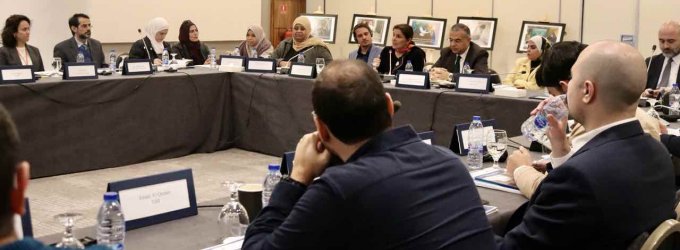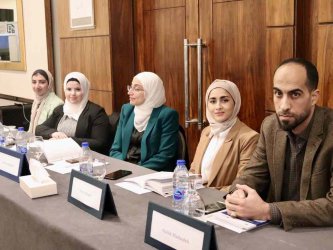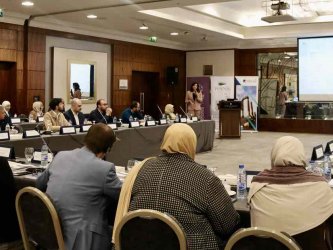WANA holds a roundtable discussion on public policies for innovation in Jordan
13 December 2022. The West Asia-North Africa (WANA) Institute and Konrad Adenauer Stiftung (KAS) office in Jordan held a roundtable discussion on Tuesday to present and advocate five policy briefs on issues related to labour contractual problems, accessibility for persons with disabilities, the collaboration between academia and the food industry sector, social entrepreneurship, and citizen’s civic engagement.
His Excellency General Secretary of the Ministry of Social Development (MoSD) Dr. Bark Al Damour gave the opening remarks on behalf of Her Excellency Minister Wafa’ Bani Mustafa by presenting the active role of MoSD in meeting the challenges facing Jordan by ensuring that the Ministry is working on policies that ensure meeting the SDG goals and not leaving anyone behind. The session enjoyed an interactive discussion among representatives from the relevant ministries, the parliament, and a number of local and international civil society organisations with the five authors of the policy papers. The roundtable discussion is part of a larger joint project titled “Public Policies for Innovation in Jordan: Realities and Ambitions” that aims to cement the dialogue between policy writers and national and international decision-makers. The project invites emerging scholars from all governorates of Jordan to engage in research and policy writing training, conduct peer reviews, and produce evidence-based policy papers.
The attendees and authors expressed the importance of a holistic, multilateral approach to difficult problems. The Director of WANA, Ms Shereen Shaheen, highlighted the need for continuous efforts to raise awareness and present concrete recommendations from a non-governmental perspective on topics of public interest. She also thanked the attendees for their commitment to engage in the democratic process of policy formation and recommendations. From his part, Dr Edmund Ratka pointed out that the KAS foundation has been operating for 40 years in the Kingdom. He expressed that the continuation of KAS work is built on successful partnerships with local institutions like the WANA Institute and the belief that youth should be part of public debates.
Dr Yara Shaban, a senior researcher at WANA Institute facilitated the discussion where each author presented their findings and recommendations. The discussion started with Atallah Mashaqbeh advocating for the use of “smart contracts” that cater to the legal needs of different workers in the construction sector. Enas Alkhatib presented how the Higher Council for the Rights of Persons with Disabilities and the Ministry of Social Development could raise awareness for persons with disabilities on their rights. Another author, Reham Hanaqta, explained why a specialised business association for the food processing sector needs to be established to advocate for Micro, Small and Medium Enterprises in governmental entities and stakeholders in the food processing sector. The discussions continued to address the challenges facing youth in social entrepreneurship. Sarah Sheikh proposed changes to The Social Security Law to differentiate between start-ups and other established enterprises in terms of social security costs. Finally, Shahd Almahameed suggested the inclusion of citizens in designing online platforms as part of the Ministry of Digital Economy and Entrepreneurship’s strategic plan to engage citizens in e-decision-making.
The policy briefs are published in a joint KAS-WANA booklet with a Foreword by His Royal Highness Prince El Hassan Bin Talal, and available online on WANA’s and KAS’s websites.
https://petra.gov.jo/Include/InnerPage.jsp?ID=46957&lang=en&name=en_news



